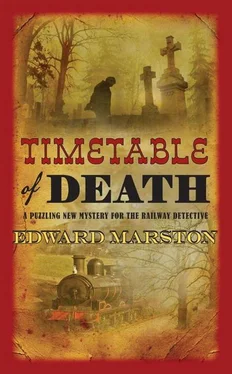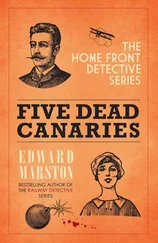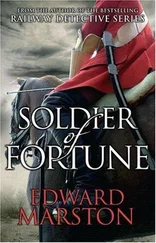Edward Marston - Timetable of Death
Здесь есть возможность читать онлайн «Edward Marston - Timetable of Death» весь текст электронной книги совершенно бесплатно (целиком полную версию без сокращений). В некоторых случаях можно слушать аудио, скачать через торрент в формате fb2 и присутствует краткое содержание. Год выпуска: 2015, ISBN: 2015, Издательство: ALLISON & BUSBY, Жанр: Исторический детектив, на английском языке. Описание произведения, (предисловие) а так же отзывы посетителей доступны на портале библиотеки ЛибКат.
- Название:Timetable of Death
- Автор:
- Издательство:ALLISON & BUSBY
- Жанр:
- Год:2015
- ISBN:9780749018122
- Рейтинг книги:4 / 5. Голосов: 1
-
Избранное:Добавить в избранное
- Отзывы:
-
Ваша оценка:
- 80
- 1
- 2
- 3
- 4
- 5
Timetable of Death: краткое содержание, описание и аннотация
Предлагаем к чтению аннотацию, описание, краткое содержание или предисловие (зависит от того, что написал сам автор книги «Timetable of Death»). Если вы не нашли необходимую информацию о книге — напишите в комментариях, мы постараемся отыскать её.
Timetable of Death — читать онлайн бесплатно полную книгу (весь текст) целиком
Ниже представлен текст книги, разбитый по страницам. Система сохранения места последней прочитанной страницы, позволяет с удобством читать онлайн бесплатно книгу «Timetable of Death», без необходимости каждый раз заново искать на чём Вы остановились. Поставьте закладку, и сможете в любой момент перейти на страницу, на которой закончили чтение.
Интервал:
Закладка:
His brother was appalled. ‘Do you hate her so much?’
‘I don’t even acknowledge her existence.’
‘What’s happened to you, Stanley? You’ve changed since you took over the mines. Father could be callous when forced to be but you make a virtue of it. I don’t have to ask Mother or Agnes how they feel. I know that, in their hearts, they’re ready to forgive and forget. They’d love to see Lydia again.’
‘Well, it won’t happen.’
‘You can’t keep her away from the funeral if she chooses to come.’
‘Yes, I can. I’ll see that she’s refused entry to the church.’
‘Would you really do such a thing?’ asked his brother.
‘I’m confident that it won’t come to that,’ said the other, softening slightly, ‘but I’ll do what Father would have wanted and that’s to shun her completely. As for getting in touch with Lydia, we don’t even know where she is.’
‘I do,’ said the other.
For a few seconds, his brother was stunned. His eyes smouldered and, when he spoke again, his voice was dripping with accusation.
‘You dared to maintain a correspondence with her?’ Stanley grabbed his brother’s lapels.
‘I’m entitled to make my own decisions about Lydia.’
‘How long has this been going on?’
Lucas waved a hand. ‘It doesn’t matter.’
‘How long , I asked?’ demanded his brother.
‘I tracked her down a few months ago.’
‘Whatever for?’ he shouted, veins standing out on his temples.
‘I was curious.’
Stanley Quayle released him and stood back, eyeing him with complete disgust. Before he could say anything, there was a tap on the door and the butler entered with a telegraph. Aware of the taut atmosphere, he simply handed it to the elder brother and left at once.
‘If it’s a telegraph, it must be important,’ said Lucas Quayle.
After glaring at him, his brother tore open the missive and glanced at it.
‘The post-mortem has been completed,’ he said, curtly. ‘Father’s body will be released to us tomorrow.’
Staying at the Malt Shovel was a mixed blessing. While he enjoyed its food and relished its beer, Victor Leeming found himself under siege. At the end of the working day, a stream of people came in turn to see him, each with what they felt was information worthy of attention and, possibly, of reward. Some of it was clearly fabricated and therefore easily dismissed, some was so confused as to be of no help at all and the rest was well meant but irrelevant. In the interests of maintaining goodwill, however, he took down all the statements and thanked each witness. When there was a lull in activity, he was tempted to slip off to his room but another person came through the door, a basket-maker from Potter Street. He was an old man with watery eyes and a croaking voice but his memory seemed unimpaired. Having taken his dog out for a walk on the night in question, the basket-maker recalled seeing a man pushing a wheelbarrow towards the church. He was too far away to see what was in the barrow but said that it was moving slowly.
Leeming was so glad for the corroboration of Barnaby Truss’s evidence that he bought the man a drink. He then retired to his room to sift through the statements he’d taken in the course of the day and to have a quiet moment alone. His escape was short-lived. The landlord pounded on the door before flinging it open.
‘There’s someone to see you, sir,’ he grunted.
‘Tell him to wait.’
‘He said he’d come up here, if you prefer.’
‘This room is not big enough for two of us,’ complained Leeming. ‘Oh, all right, I’ll come down at once,’ he said, getting up from his chair. ‘But I can’t spend the whole evening down there. The world and his wife want to see me.’
When he clattered down the stairs, he was in a resigned mood but his face brightened when he saw who his visitor was. Colbeck was seated at a table in the corner with two tankards of beer on it.
‘This is good,’ he said, taking another sip. ‘What about the food?’
‘It’s wholesome, sir.’
‘How does it compare with the menu at the Royal Hotel?’
‘The pork pie is grand but the choice is a bit limited.’
After taking the seat opposite Colbeck, the sergeant downed the first couple of inches of his beer before using the back of his hand to wipe the froth from his mouth. He gave an abbreviated account of his day and was pleased with the way that Colbeck complimented him on his visit to the churchyard to search for marks of a barrow.
‘This could be an important sighting,’ said the inspector.
‘It was verified by a second man.’
‘Then you have to find out if someone else was abroad at that time of night. What’s the latest train to get into Spondon? Who was on it and which way did they walk home? I suppose it’s not unusual for someone to be pushing a wheelbarrow about in a village like this.’
‘It is if there’s a dead body in it, sir.’
‘We don’t know that for certain.’
‘What else could he have been taking up that hill?’
‘Did anyone actually see him enter the churchyard?’
‘No,’ conceded Leeming, ‘but I found those wheel marks there. They were quite deep and obviously caused by a heavy load. Anyway,’ he went on, taking another long drink, ‘what have you been up to, sir?’
‘Oh, it’s been a full day.’
Colbeck’s version of events was concise and lucid. He talked about his visit to Nottingham and what he’d learnt there about the Quayle family. He’d returned to Derby, called in at the hotel and found an important letter awaiting him.
‘What was it, sir?’
‘It was a copy of the post-mortem report, Victor. It appears that the victim was sedated before he was injected with a poison. Since he’s not an expert toxicologist, the man who conducted the post-mortem was not entirely sure of all the elements in that poison but his conclusion is that death would have been fairly swift. Whoever killed Mr Quayle knew exactly what he was doing.’
CHAPTER EIGHT
Lost in thought, Lydia Quayle walked along the Thames embankment in the fading light of a warm evening. She was torn between family loyalty and an abiding hatred, nudged by an impulse to return home for the funeral yet repelled by the memory of the man who would be lowered into his grave. Years of deep anger could not be so easily laid to rest. When she’d made the decision to leave Nottingham and all its associations behind her, she’d vowed never to return, trying to create a new life for herself elsewhere. Lydia had even persuaded herself that she was happy being independent and free from the dictates of others. But the move to London had not been without its disappointments and limitations. It had taken her time to adapt to them.
When she first saw the newspaper report about the murder of her father, she’d felt an instant elation and wanted to meet the killer in order to thank him for doing something that she had considered doing in her darkest moments. Shame had quickly set in, to be replaced by a distant pity but that, too, had soon evaporated. Recalling what her father had done and — above all — said to her, the bitterness had returned afresh. Devoid of love for him, she could not even find an ounce of regret, still less of forgiveness. If she went back home, it would be to rejoice in his death.
Lydia made an effort to put her father aside and to consider the other members of her family. Her mother might be glad to see her, though she’d offered her elder daughter little support when the turmoil had occurred. On the other hand, she was a sick woman and that had been taken into account. She’d had no strength to oppose the wishes of her husband or to protect Lydia in some way and had therefore appeared to condone what was going on. Stanley would certainly not welcome her and might even forbid her to enter the house. He was simply a younger version of their father with the same implacable resentment towards her. Nor would Stanley’s wife speak up for her. She was far too dutiful and submissive.
Читать дальшеИнтервал:
Закладка:
Похожие книги на «Timetable of Death»
Представляем Вашему вниманию похожие книги на «Timetable of Death» списком для выбора. Мы отобрали схожую по названию и смыслу литературу в надежде предоставить читателям больше вариантов отыскать новые, интересные, ещё непрочитанные произведения.
Обсуждение, отзывы о книге «Timetable of Death» и просто собственные мнения читателей. Оставьте ваши комментарии, напишите, что Вы думаете о произведении, его смысле или главных героях. Укажите что конкретно понравилось, а что нет, и почему Вы так считаете.












